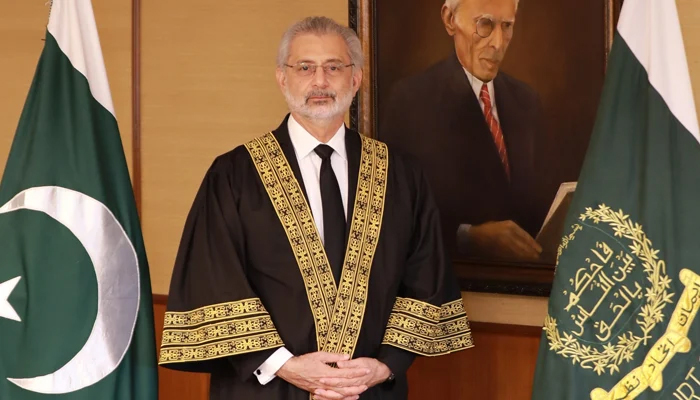SC seeking to fix history in ZAB case: CJP
CJP made remarks during hearing of the presidential reference seeking to review death sentence awarded to the PPP founder
ISLAMABAD: Chief Justice of Pakistan (CJP) Qazi Faez Isa on Monday said the Supreme Court of Pakistan was currently looking at one person’s honour and seeking to fix the history “as it wants to set a better example” in a presidential reference pertaining to the death sentence awarded to former premier Zulfikar Ali Bhutto.
The CJP made these remarks during the hearing of the presidential reference seeking to review the death sentence awarded to the Pakistan Peoples Party (PPP) founder. The apex court’s larger bench led by CJP Isa and comprising Justice Sardar Tariq Masood, Justice Syed Mansoor Ali Shah, Justice Yahya Afridi, Justice Amin-ud-Din Khan, Justice Jamal Khan Mandokhel, Justice Muhammad Ali Mazhar, Justice Syed Hasan Azhar Rizvi and Justice Musarrat Hilali resumed hearing of the presidential reference seeking to revisit the 1979 ‘controversial’ death sentence.
At the outset of the hearing, PPP leader Senator Raza Rabbani came to the rostrum. “Are you an amicus curiae?” questioned CJP Isa. To this, Rabbani said he was representing Sanam Bhutto, Bakhtawar Bhutto and Asifa Bhutto in the case, adding that he had submitted a petition to become a party in the case. Meanwhile, Zahid Ibrahim said he was representing Zulfikar Bhutto Jr and Fatima Bhutto. Amicus curiae Makhdoom Ali Khan then began his arguments, saying that the chief justice had sought the transcript of an interview in the same case.
At this, Justice Mazhar said this reference was based on the interview of former Justice Naseem Hasan Shah. Justice Shah said the top court could not decide the case just by watching an interview. “The court can only give an opinion on legal questions under Article 186,” he added.
At this, Makhdoom said the question was not about Bhutto’s execution but about the stain on his character. “Later, one of the judges said in an interview that he gave the verdict under pressure,” he said. After this, the court played the interview of Justice Shah. Justice Shah said only one of the judges gave an interview while others who were part of the bench remained quiet. Justice Shah remarked that the only point was that the judiciary was not independent at that time.
Justice Afridi then said a single interview could not decide that the judiciary was not independent at that time. “There were other judges who wrote their notes and dissented,” he added. At this, the CJP highlighted that the ratio of the bench in Bhutto’s case was such that the opinion of one judge was also important.
Makhdoom compared the reference to the Samiullah Baloch case, saying that the judge who wrote the verdict withdrew his decision. He said the court should reexamine the case if it believed justice was “massacred”.
Later, Justice Hilali said the court needed to fix the history as this “black spot” is not only on a person’s character but on some institutions. The apex court then adjourned the hearing till the third week of February, keeping in view the upcoming general elections.
-
 Cure Flu With Theses Two Golden Foods
Cure Flu With Theses Two Golden Foods -
 King Charles Delayed Taking Firm Stance Against Andrew But William Pushed Action
King Charles Delayed Taking Firm Stance Against Andrew But William Pushed Action -
 Toronto Blue Jays Roster Faces Setback With Multiple Injury Concerns
Toronto Blue Jays Roster Faces Setback With Multiple Injury Concerns -
 Demi Lovato Leaves Fans Disappointed With Unexpected Announcement
Demi Lovato Leaves Fans Disappointed With Unexpected Announcement -
 Pacers Vs Knicks Overtime Thriller Ends In Heartbreak For New York
Pacers Vs Knicks Overtime Thriller Ends In Heartbreak For New York -
 Who Owns The Ambassador Bridge? New Report Links Owner Matthew Moroun To Trump’s Threat
Who Owns The Ambassador Bridge? New Report Links Owner Matthew Moroun To Trump’s Threat -
 ICE Detention Center Plan Sparks Controversy In Maryland As Lawmakers Push Back
ICE Detention Center Plan Sparks Controversy In Maryland As Lawmakers Push Back -
 Blood Pressure Medication Recalled After Wrong Tablets Found In Bottles
Blood Pressure Medication Recalled After Wrong Tablets Found In Bottles -
 Why Ariana Grande Wants A 'tiny Mouse' To Play Her In Biopic?
Why Ariana Grande Wants A 'tiny Mouse' To Play Her In Biopic? -
 Wind Chill Returns With Brutal Cold As Polar Vortex Stalls Over Canada
Wind Chill Returns With Brutal Cold As Polar Vortex Stalls Over Canada -
 Princess Beatrice, Eugenie ‘do Not Want To Be Seen In Public’ Because Of Dad
Princess Beatrice, Eugenie ‘do Not Want To Be Seen In Public’ Because Of Dad -
 Costco $20 Rule Explained As Employee Pay Climbs Across North America
Costco $20 Rule Explained As Employee Pay Climbs Across North America -
 Strange Incident Happened At Nancy Guthrie's Home On Abduction's 10th Day
Strange Incident Happened At Nancy Guthrie's Home On Abduction's 10th Day -
 Tumbler Ridge School Lockdown Underway As RCMP Investigate School Shooting
Tumbler Ridge School Lockdown Underway As RCMP Investigate School Shooting -
 Royal Family Knows There Can Be ‘no More Glossing’ Of Andrew Downfall
Royal Family Knows There Can Be ‘no More Glossing’ Of Andrew Downfall -
 Britney Spears Quietly Parts Ways With Her Music Catalog: Report
Britney Spears Quietly Parts Ways With Her Music Catalog: Report




